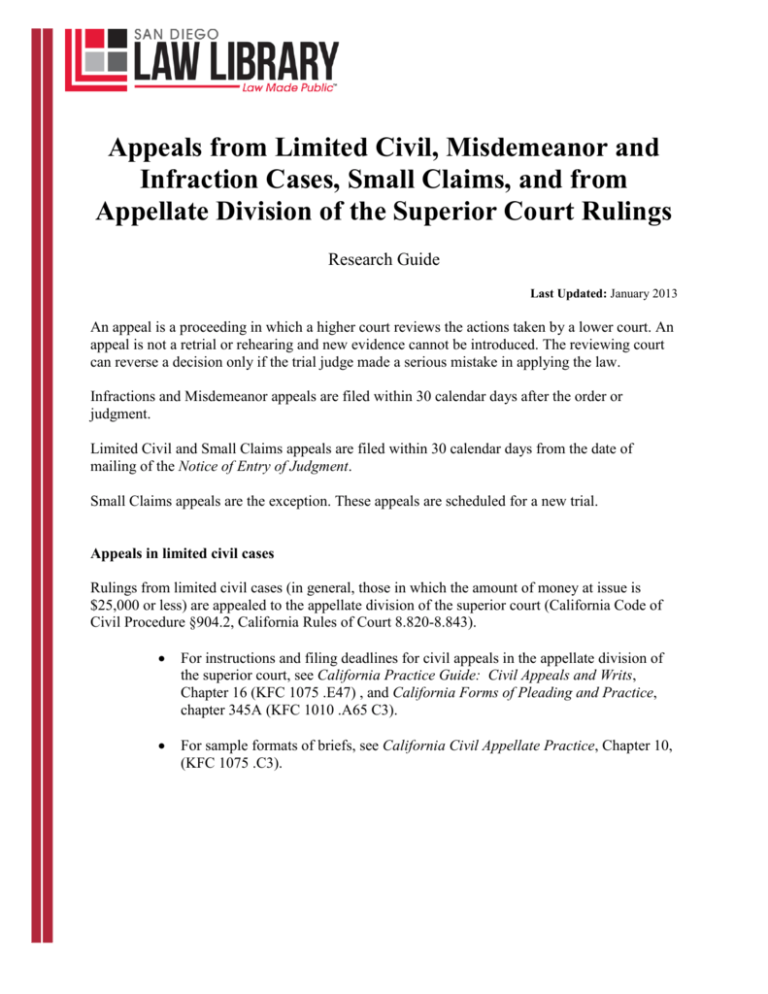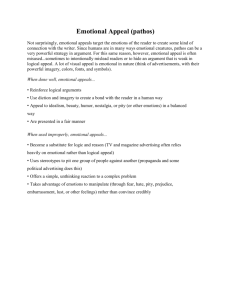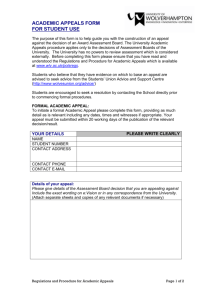Appeals from Limited Civil, Misdemeanor and Infraction Cases
advertisement

Appeals from Limited Civil, Misdemeanor and Infraction Cases, Small Claims, and from Appellate Division of the Superior Court Rulings Research Guide Last Updated: January 2013 An appeal is a proceeding in which a higher court reviews the actions taken by a lower court. An appeal is not a retrial or rehearing and new evidence cannot be introduced. The reviewing court can reverse a decision only if the trial judge made a serious mistake in applying the law. Infractions and Misdemeanor appeals are filed within 30 calendar days after the order or judgment. Limited Civil and Small Claims appeals are filed within 30 calendar days from the date of mailing of the Notice of Entry of Judgment. Small Claims appeals are the exception. These appeals are scheduled for a new trial. Appeals in limited civil cases Rulings from limited civil cases (in general, those in which the amount of money at issue is $25,000 or less) are appealed to the appellate division of the superior court (California Code of Civil Procedure §904.2, California Rules of Court 8.820-8.843). For instructions and filing deadlines for civil appeals in the appellate division of the superior court, see California Practice Guide: Civil Appeals and Writs, Chapter 16 (KFC 1075 .E47) , and California Forms of Pleading and Practice, chapter 345A (KFC 1010 .A65 C3). For sample formats of briefs, see California Civil Appellate Practice, Chapter 10, (KFC 1075 .C3). 2|Page Appeals in misdemeanor and infraction cases Misdemeanor and infraction convictions are typically first appealed to the appellate division of the superior court, and not directly to the California Court of Appeal. These appeals are governed by California Rules of Court §8.850-8.855 and 8.900-8.904. For a discussion of misdemeanor and infraction appeals to the appellate division of the superior court, see Fight Your Ticket & Win in California, Chapter 16, (KFC 477 B76). Sample briefs for appealing a misdemeanor or infraction conviction are available in California Criminal Law Forms Manual, chapter 41 (KFC1155.A65 C343); and Fight Your Ticket & Win in California, Chapter 16 (KFC 477.Z9 B76).? Common grounds for appealing a traffic-related conviction are discussed in the book Fight Your Ticket & Win in California, Chapter 16, (KFC 477.Z9 B76). Trial of small claims cases on appeal Judgments in small claims cases are initially appealed to the regular civil division of the superior court (not the appellate division), and you are entitled to a whole new trial, called “trial de novo.” Rules relating to the right to appeal a small claims judgment can be found in California Code of Civil Procedure §§ 116.710 – 116.795. These appeals are governed by California Rules of Court §§8.950 – 8.966. For a discussion of small claims appeals to the superior court, see the Consumer Law Sourcebook: Small Claims Court Law and Procedure, Chapter 15 (KFC 976 .R47). Everybody’s Guide to Small Claims Court in California, Chapter 23 (KFC 976 .W3 2012). The California Courts Online Self-Help Center has a section on appealing small claims cases at http://www.courts.ca.gov/selfhelp-smallclaims.htm The judgment of the superior court after a hearing on appeal is final and not appealable, California Code of Civil Procedure §116.780. The California Court of Appeal has accepted writ petitions, however, where appellate review is necessary “to secure uniformity in the operations of the small claims courts and uniform interpretation of the statutes governing them.” Linton v. Superior Court (1997) 53 Cal.App.4th 1097, 1099. Appeals For instructions on when and how to file a writ petition, see California Civil Writ Practice (KFC 1075 .C34). 3|Page Transfer of appellate division cases to the court of appeal If you are dissatisfied with the ruling of the appellate division of the superior court, your options for having that decision reviewed by a higher court are very limited. For rules on transferring cases from the superior court appellate division to the Court of Appeal see California Rules of Court 8.1000 through 8.1008. The appellate division of the superior court may certify a case for transfer to the Court of Appeal on its own motion or on a party’s application. California Rule of Court 8.1005(a)(1). For a discussion of transfer on certification by the superior court, see California Forms of Pleading and Practice, Chapter 345A, section 345A.72 (KFC 1010.A65 C3). A sample Application for Certification to Transfer Appeal Pending in Appellate Division of Superior Court of Appeal is available in California Forms of Pleading and Practice, Chapter 345A, sec. 345A.125 (KFC 1010.A65 C3). For an example of a Petition for Supreme Court Review, see California Practice Guide: Civil Appeals and Writs, Chapter 13, form 13A (KFC 1075.E47 1989). Please note that because a petitioner must show that transfer to the Court of Appeal is “necessary to secure uniformity of decision or to settle an important question of law,” and not simply that the judge made a mistake or was unfair, certification or transfer to the Court of Appeal is rarely granted. The decision of the appellate division of the superior court is usually final and unappealable. Appeals




